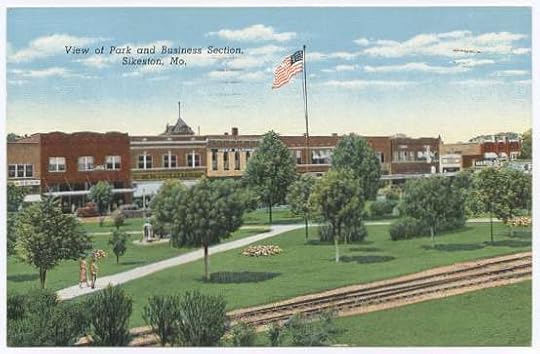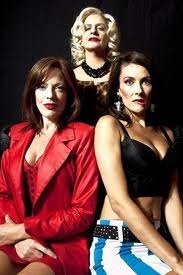Terry Teachout's Blog, page 274
November 10, 2010
TT: In memoriam
TT: So you want to see a show?
Here's my list of recommended Broadway, off-Broadway, and out-of-town shows, updated weekly. In all cases, I gave these shows favorable reviews (if sometimes qualifiedly so) in The Wall Street Journal when they opened. For more information, click on the title.
Warning: Broadway shows marked with an asterisk were sold out, or nearly so, last week.
BROADWAY:
• Bloody Bloody Andrew Jackson (musical, PG-13/R, reviewed here)
• La Cage aux Folles (musical, PG-13, adult subject matter, reviewed here)
• Driving Miss Daisy * (drama, G, possible for smart children, closes Jan. 29, reviewed here)
• Fela! (musical, PG-13, adult subject matter, closes Jan. 2, reviewed here)
• Lombardi (drama, G/PG-13, a modest amount of adult subject matter, reviewed here)
• The Merchant of Venice * (Shakespeare, PG-13, adult subject matter, closes Jan. 9, reviewed here)
• Million Dollar Quartet (jukebox musical, G, reviewed here)
• The Pitmen Painters (serious comedy, G, too demanding for children, closes Dec. 12, reviewed here)
OFF BROADWAY:
• Alfred Hitchcock's The 39 Steps (comedy, G, suitable for bright children, original Broadway production reviewed here)
• Angels in America (drama, PG-13/R, adult subject matter, closes Feb. 20, reviewed here)
• Avenue Q (musical, R, adult subject matter and one show-stopping scene of puppet-on-puppet sex, reviewed here)
• The Fantasticks (musical, G, suitable for children capable of enjoying a love story, reviewed here)
CLOSING SOON ON BROADWAY:
• A Life in the Theatre (serious comedy, PG-13, closes Nov. 28, reviewed here)
CLOSING SUNDAY IN CHICAGO:
• Night and Day (serious comedy, PG-13, reviewed here)
TT: Snapshot
(This is the latest in a weekly series of arts-related videos that appear in this space each Wednesday.)
TT: Almanac
Martin Buber, I and Thou
November 9, 2010
TT: Almanac
Edmund Burke, Reflections on the Revolution in France
November 8, 2010
TT: Just because
TT: Taking the test
Far from spending their college years in a meritocratic melting pot, the New Elite spend school with people who are mostly just like themwhich might not be so bad, except that so many of them have been ensconced in affluent suburbs from birth and have never been outside the bubble of privilege. Few of them grew up in the small cities, towns or rural areas where more than a third of all Americans still live....
With geographical clustering goes cultural clustering. Get into a conversation about television with members of the New Elite, and they can probably talk about a few trendy shows"Mad Men" now, "The Sopranos" a few years ago. But they haven't any idea who replaced Bob Barker on "The Price Is Right." They know who Oprah is, but they've never watched one of her shows from beginning to end.
Talk to them about sports, and you may get an animated discussion of yoga, pilates, skiing or mountain biking, but they are unlikely to know who Jimmie Johnson is (the really famous Jimmie Johnson, not the former Dallas Cowboys coach), and the acronym MMA means nothing to them.
They can talk about books endlessly, but they've never read a "Left Behind" novel (65 million copies sold) or a Harlequin romance (part of a genre with a core readership of 29 million Americans).
They take interesting vacations and can tell you all about a great backpacking spot in the Sierra Nevada or an exquisite B&B overlooking Boothbay Harbor, but they wouldn't be caught dead in an RV or on a cruise ship (unless it was a small one going to the Galapagos). They have never heard of Branson, Mo.
There are so many quintessentially American things that few members of the New Elite have experienced. They probably haven't ever attended a meeting of a Kiwanis Club or Rotary Club, or lived for at least a year in a small town (college doesn't count) or in an urban neighborhood in which most of their neighbors did not have college degrees (gentrifying neighborhoods don't count). They are unlikely to have spent at least a year with a family income less than twice the poverty line (graduate school doesn't count) or to have a close friend who is an evangelical Christian. They are unlikely to have even visited a factory floor, let alone worked on one.
Taken individually, members of the New Elite are isolated from mainstream America as a result of lifestyle choices that are nobody's business but their own. But add them all up, and they mean that the New Elite lives in a world that doesn't intersect with mainstream America in many important ways....
Up to a point, I think Murray is onto somethingbut only up to a point. Take, for instance, the case of yours truly. Yes, I'm an aesthete with an art collection who lives on the Upper West Side of Manhattan, earns his living as a drama critic, used to play jazz, has written two opera libretti, and loves to stay in B&Bs. But that's not all I am, or all I've done:
 • I spent the first eighteen years of my life in a small town, and I've never lived in a suburb, affluent or otherwise.
• I spent the first eighteen years of my life in a small town, and I've never lived in a suburb, affluent or otherwise.• I got my bachelor's degree from a Southern Baptist college.
• I watched the first three seasons of The Sopranos, but have yet to see a single episode of Mad Men.
• I had to look up Jimmie Johnson and the MMA , but I do know that Drew Carey replaced Bob Barker on The Price Is Right, and I've seen plenty of episodes of The Oprah Show from beginning to end.
• I've never read a "Left Behind" book, but I saw (and wrote about) Left Behind: The Movie.
• Not only did I spend countless nights in my father's various RVs, but I went to Branson for my first honeymoon, and I used to play in a country band.
• I won a Rotary Club speaking contest in high school.
• Most of the members of my family, both immediate and extended, are evangelical Christians.
So who am I, Charles Murray? Where do I fit into your system of cultural pigeonholes? How do you explain meand might my very existence suggest that America is a more complicated place than you care to admit?
TT: Almanac
Edmund Burke, letter to Charles James Fox (October 8, 1777)
November 4, 2010
TT: Almanac
Vladimir Nabokov, Speak, Memory
TT: Reason to be nervous
* * *
Recipe for a commodity musical: (1) Take an ultra-familiar piece of source material, preferably a hit movie. (2) Adapt it for the stage in the most literal and obvious way imaginable, adding only extra jokes. (3) Stir in a dozen or so innocuous songs that won't divert the audience's attention from how closely the stage version resembles its source. If you're lucky, you get "The Addams Family"; if not, "9 to 5." Either way, you get the kind of been-there-seen-that musical that has been blighting Broadway for the past decade and more.
 So what does this formula have to do with "Women on the Verge of a Nervous Breakdown," Lincoln Center Theater's big-budget musical version of Pedro Almodovár's 1988 screen comedy about three women whom love has driven to the brink of madness? The answer is that Jeffrey Lane and David Yazbek, last seen on the Great White Way as the creators of "Dirty Rotten Scoundrels," have now sought to commoditize not an off-the-rack Hollywood comedy but one of the most individual and significant Spanish-language films of the postwar era. It's as if they'd tried to turn "Shoot the Piano Player" or "Wings of Desire" into a Big Mac musical--and the results, not at all surprisingly, are a flavorless mess....
So what does this formula have to do with "Women on the Verge of a Nervous Breakdown," Lincoln Center Theater's big-budget musical version of Pedro Almodovár's 1988 screen comedy about three women whom love has driven to the brink of madness? The answer is that Jeffrey Lane and David Yazbek, last seen on the Great White Way as the creators of "Dirty Rotten Scoundrels," have now sought to commoditize not an off-the-rack Hollywood comedy but one of the most individual and significant Spanish-language films of the postwar era. It's as if they'd tried to turn "Shoot the Piano Player" or "Wings of Desire" into a Big Mac musical--and the results, not at all surprisingly, are a flavorless mess....For all its seeming lunacy, "Women on the Verge" is in fact a wholly serious comedy about a macho culture that encourages men to be faithless to the women who love them. The fact that Mr. Almodovár is gay made it easier for him to portray that culture with a sharp-eyed detachment that did nothing to diminish his sympathy for his female characters. That's part of what makes "Women on the Verge" more than a dizzy sex comedy: You always know whose side it's on.
To turn so fully realized a work of cinematic art into an equally successful musical demands that it be subjected to a complete and thoroughgoing imaginative transformation. Otherwise, the new version will seem superfluous--which is what's wrong with the stage version of "Women on the Verge." Instead of breaking new creative ground, Mr. Lane's book tracks Mr. Almodovár's setting and plot slavishly, salting his script with unfunny one- and two-liners that serve only to dilute the crisp, elliptical dialogue of the screenplay. As for Mr. Yazbek's songs, they're as forgettable as Muzak in a noisy restaurant...
* * *
Read the whole thing here .
Terry Teachout's Blog
- Terry Teachout's profile
- 45 followers



